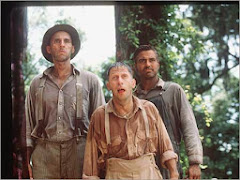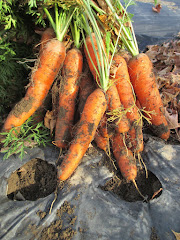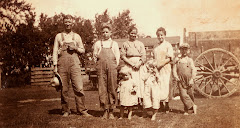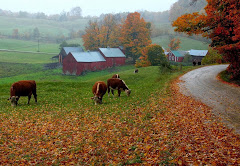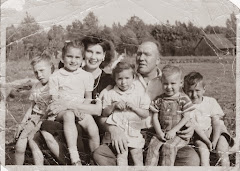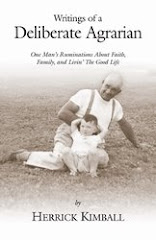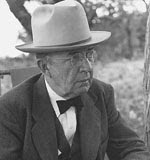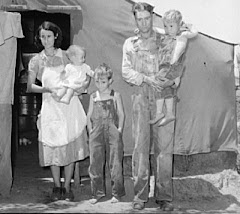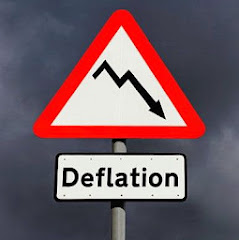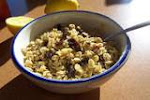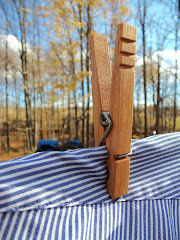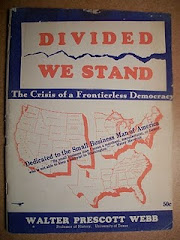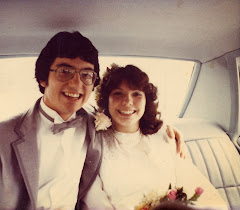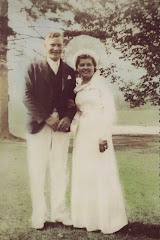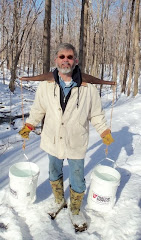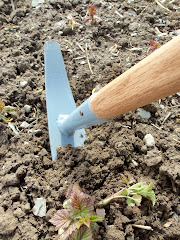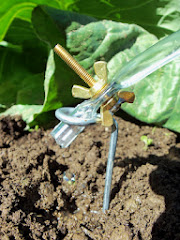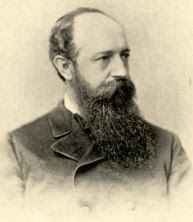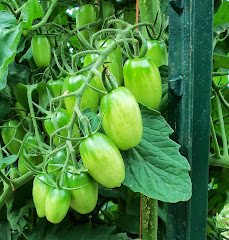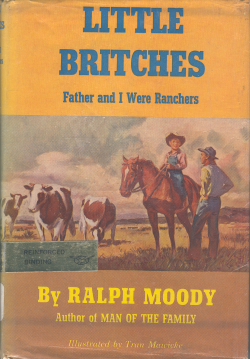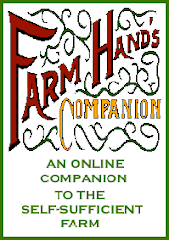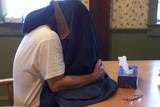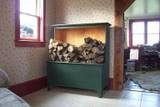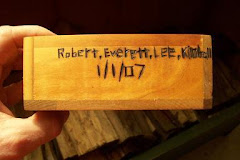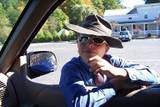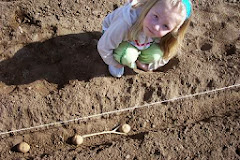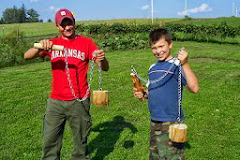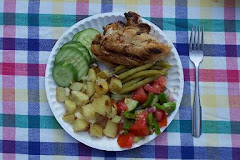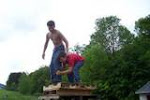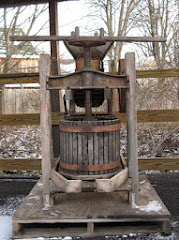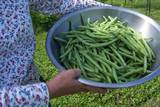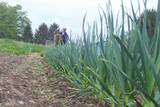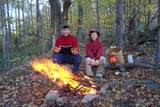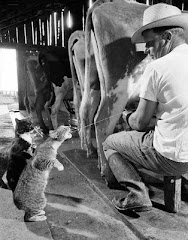Dateline: 2 April 2006
Last October (about five months ago) I posted a story here about how my family made our own fresh-squeezed apple cider. And I’ve posted more recently about how, when I made the cider, I filled two widemouth gallon jars with the sweet elixir, tied some cheesecloth over the tops and set them up on a shelf in the back entryway of our house. Steve Lonsky, a homesteading friend of mine told me that was all you have to do to make vinegar.
Steve has made his own vinegar for years in a large crock. Back when my mom was sick with cancer, and she was trying natural methods of healing, she needed some “real” cider vinegar and Steve gave us a gallon jug of his “home-brew” vinegar. That was a real blessing.
Unlike the typical store-bought stuff, “real” apple cider vinegar has the “mother” in it. Mother is defined in my dictionary as ‘a stringy, gummy, slimy substance formed by bacteria in vinegar, or on the surface of fermenting liquids.” That’s a pretty good description. You could also describe it as “gelatinous.”
The way I understand it, a naturally-occurring bacteria in the air settles through the cheesecloth and turns the sugars in the cider into alcohol. Then another naturally-occurring bacteria works on the alcohol to make vinegar and, in the process, the mother forms.
We watched all of this take place on the top shelf over the last few months. It’s not a pretty sight—but it is fascinating. In time, the contents of each jar separated into a bottom layer of sediment about an inch deep, a gelatinous layer of mother around 1/4” thick on the top, and a clarified, golden-yellow liquid in between.
I asked my friend, Steve, how I would know when the vinegar was done? He told me to taste it. That mother stuff was a real turnoff so I just let the jars set awhile longer. But the longer it set, the more liquid evaporated away. I had originally filled the jars a little more than 3/4 full and, last weekend, they were only a little bit more than half full. Marlene was encouraging me to take the jars down and see what we had. She even volunteered to taste it.
And so it was last weekend that I carefully took the jars down off their shelf and set them on the kitchen table. I figured that the best way to get the vinegar out of each jar was to use a small syphon hose, and I had determined that I would filter the liquid too.
We had some unbleached coffee filters left over from one of my past “experiments” and they proved to be an excellent filter material. I used a few clothespins to hold a double layer of filters in a wide-mouth canning funnel, which I set into the top of a 1/2 gallon canning jar. I put the canning jar on a chair that was below the table.
I thought we had a small-diameter hose for syphoning but could not find it. I did, however, find a hard plastic “crazy straw” in one of the kitchen drawers. With the help of a heat gun, I was able to soften, unbend, and reshape the straw into a simple U-bend.
I put one end of the U-bend down into the vinegar jar, past the scummy mother, so it rested near-but-not-in the bottom layer of sediment. The other end of the U-bend hung outside the jar, below the edge of the table. I positioned the filter and empty jar underneath, put my mouth on the straw, and sucked in.
It’s a real trick to suck on one end of a syphon tube and not get a taste. Years ago I syphoned gasoline out of my car’s gas tank and got a mouthful. That was bad. Real bad. So, of course, I got the first taste of the vinegar experiment, but it wasn’t bad. Fact is, it tasted just like vinegar.
The vinegar flowed slowly but steadily out of the straw and dripped, nicely filtered, into the canning jar. The liquid was not brownish-colored, as is store-bought apple cider vinegar. It was a beautiful golden-yellow color. It was the same color as Steve Lonsky’s homemade vinegar.
Marlene filled a teaspoon under the stream and sampled it. With great delight, she declared it to be wonderfully smooth and flavorful. Then she offered me a spoonful (far more than the little syphon taste) and I swallowed it down. After the obligatory facial distortion and involuntary full-body spasm, I gasped out that it was, indeed, good vinegar. We filtered out a gallon of the beautiful liquid.
As soon as one jar was empty. Marlene reached in, pulled out the gelatinous mother, and started to examine it. That was disgusting. If you haven’t figured it out by now, Marlene is something of a vinegar enthusiast. She buys Braggs organic apple cider vinegar with the mother in it at the organic food store. Hardly a day goes by that she doesn’t put a couple tablespoons of Bragg’s vinegar in a tall glass of cold water and drink it. I think she actually does this two or three times a day. It is supposed to help balance your body’s ph. Because the vinegar contains live active cultures, it is also a probiotic. Marlene gives this vinegar-water to my son Robert to keep him healthy. He calls it miracle juice and chugs it down. And he is very healthy.
Yesterday morning I was feeling lousy. I was in the grip of a flu bug. My body ached. I felt chilled. I felt feverish. I was sitting at the kitchen table lamenting the fact that I had planned to do so much that day but all I wanted to do was take a hot bath and go to bed. Marlene filled a tall glass of cold water, added some of our homemade vinegar to it, and set it in front of me. “Here drink this,” she said. I asked her in my slow, feeble, sickly voice, “Tell me again what this is supposed to do for me.” She replied, “It just makes you feel good.”
So I drank it down. And it did make me feel good. In fact, that old James Brown song started playing in my head. I jumped up, gave a screeching yowl and launched into the song....”I feel good, I knew that I would, now. I feel good, I knew that I would, now. So good, so good.....”
I was gyrating around the kitchen floor (miraculously, I had rhythm too).... I felt strong. I felt healthy. I felt virile. Watch out Marlene.... “Whoa! I feel nice, like sugar and spice. I feel nice, like sugar and spice. So nice, so nice, I got you....”
It was an amazing sight to behold, especially from a quiet, mild-mannered, agrarian guy like me. But raw organic apple cider vinegar with the mother in it can do amazing things... “Whoa! I feel good, I knew that I would, now. I feel good, I knew that I would. So good, so good, I got you. So good, so good, I got you. HEY!!
Okay, I confess, that isn’t the way it went. Actually, I drank it (and took some herbal tinctures and some oil of oregano) and took a hot bath and went to bed.
=============================
All kidding aside, I really do believe that “real” apple cider vinegar is good for a body. Before the advent of “industrialized” store-bought vinegar (which is nothing like the “real” stuff) people used to use the real stuff. And I think they tended to use it more often. A cruet of vinegar was as common as salt and pepper at the dinner table. The old Yankee haymaker’s drink, switchel, was, essentially, vinegar water with molasses and ginger. I think those old timers were on to something.
====================
In the end, my apple cider vinegar experiment was a resounding success! The beauty of it all was that I really didn’t have to do anything to make the vinegar. I just filled the jars with apple cider and let them set. The bacteria did all the work.
That said, we intend to make vinegar again this year. We’re enthused about this new homestead skill we’ve discovered.
Now I’m really looking forward to summer salads from the garden with oil & vinegar (our own homemade vinegar) dressing. And my mouth is watering at the thought of steamed beet greens with vinegar drizzled over them.
I think making apple cider vinegar is just another small example of what it means to live the good life.
==========
UPDATED INFORMATION....March 2009
Since this essay was written I have continued to make apple cider and apple cider vinegar. I've also written the book, Anyone Can Build A Whizbang Apple Grinder And Cider Press. You can learn more at THIS LINK








